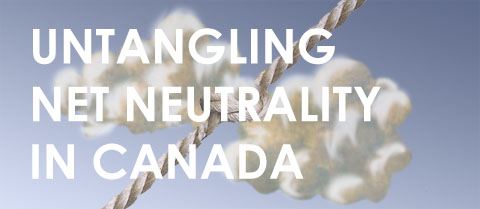CRTC ruling merely “a framework”
The CRTC has finally ruled in the long standing Bell throttling case. The ruling is a bit of a mish-mash of both good and bad, and a fair bit of haziness. Although there is a requirement of transparency from the major ISPs to both their retail and wholesale customers, it looks like Internet Traffic Management Practices (ITMPs) such as throttling will likely continue at least until the first complaint rolls into the CRTC (which should happen pretty fast).
The Canadian Radio-television and Telecommunications Commission (CRTC) today introduced a new framework to guide Internet service providers (ISPs) in their use of Internet traffic management practices. The Commission is also requiring ISPs to inform consumers of their practices, which will help them to make more informed decisions about the Internet services they purchase and use.
“Canada is the first country to develop and implement a comprehensive approach to Internet traffic management practices,” said Konrad von Finckenstein, Q.C., Chairman of the CRTC. “The centrepiece of our approach is a framework of analysis that will be employed to determine whether economic and technical practices are acceptable.” [from the CRTC]
In the ‘good’ category is the CRTC stand on privacy, and one of the few items that is clear cut…
…the Commission finds it appropriate to establish privacy provisions in order to protect personal information. The Commission therefore directs all primary ISPs, as a condition of providing retail Internet services, not to use for other purposes personal information collected for the purposes of traffic management and not to disclose such information.
Though minor, it’s definitely one of the positive points of the ruling, and seems in line with other Canadian privacy issues, such as the Privacy Act’s ruling against Facebook.
Another interesting issue is how this will apply to wireless carriers. As internet connected phones increasingly become a staple in the consumer landscape, and in some cases straight up ISPs in their own right, the CRTC is looking into extending this framework to the wireless realm.
Finally, the Commission notes that this proceeding did not provide an appropriate vehicle for re-examining forbearance regarding mobile wireless data services. However, considering the increasingly important role of such services to telecommunications in Canada, and for the purposes of technologically neutral regulation related to ITMPs, the Commission intends to review, at a future date, the appropriateness of reapplying section 24 and subsection 27(2) of the Act to mobile wireless data services.
In the interim, the Commission expects ISPs using mobile wireless data services to offer Internet access services in accordance with the determinations of this decision.
How this will play out with 3rd party VOIP type apps like Skype and Vonage, or video apps like YouTube on smart phones will be interesting, especially as the carriers promise 7Mbps and faster services. From the sounds of it, the framework, at least in the interim, would prevent the carriers from locking out such applications, even if it means people using data to make phone calls via Skype as opposed to their plan’s minutes.
That’s the good…
Other parts of the ruling seem more murky however, as although throttling should be considered a last resort, there’s no specific mandate saying it HAS to be the last resort, putting the onus on the customer or wholesaler to lodge a complaint. This suggests that primary ISPs such as Bell and Rogers will continue to do so, at least until complaints start to roll in.
One of the biggest problems is that there are a number of ISPs who are stifled from innovation because of Bell, as they require that ‘last mile’ of copper to access their own retail customers. In these cases, Bell will still be able to apply throttling to the wholesalers, regardless of where in the network chain they separate from Bell’s networks. Although this is outside the realm of the new framework, I’d humbly suggest that the CRTC needs to address the issue of real competition sooner as opposed to later, as there have been numerous cases in the past where Bell has prevented wholesalers like Acanac from getting away from Bell altogether. Of course, this isn’t surprising considering that for every customer that Acanac or TekSavvy gets, Bell still gets to charge in the realm of $17-20 a month just to manage the line.
The issue of getting the ‘secondary ISPs’ onto the faster network isn’t addressed at all.
Finally…
Whenever possible, ISPs should give preference to Internet traffic management practices based on economic measures. These practices are the most transparent as they are clearly identified on monthly bills. With this information, consumers can compare between different Internet services and match their bandwidth needs with the amount they are willing to pay. Technical means to manage traffic, such as traffic shaping, should only be employed as a last resort.
This is somewhat disappointing, as it creates an environment where upgrading technology is less important than padding the consumers’ bill. For example, if you have a network that is near saturation, this gives the primary ISPs incentive to scale back their bit caps, and charge more for overages, as opposed to innovating and bringing faster technologies to the market sooner. Similarly, it would have been a better ruling if it also included some sort of enforcement of neutrality between a primary ISP like Bell, and wholesalers.
For both the retail and wholesale markets, the Commission will use its new framework to review practices that raise concerns or generate complaints.
So far, there’s been no distinction between wholesale customers who depend on Bell all the way up the network food chain, and those who have been struggling to get off Bell’s teat, only to challenged. Make no doubt about it. Although this ruling applies to all ISPs, it affects Bell and its wholesalers the most. I think it also casts a strong light into how much control Bell has over the last mile for many, and highlights one of the reasons why Canada continues to slip further back in the bandwidth race.
In the end, it’s a mixed bag, and since much of the language is set up as a framework as opposed to actual regulation, it’ll be interesting to see how it pans out moving forward.





The way the CRTC has dealt with net neutrality is like a case study into how to structure a decision-making process like a long circuitous bowel, so that the end they plan to screw is as delayed and disguised from public view as possible.
I’m not sure that I’m THAT cynical about it, but the wishy washy stance on throttling, putting the onus on end users, was pretty weak.
I definitely like the idea (though temporary at this point) of putting the wireless internet providers in the same category, which suggests that the carriers won’t be able to block technologies like Skype or Google Voice.
Oh yeah, there’s some interesting comments over at DSL Reports as well… a lot of them. In case you’re curious…
http://www.dslreports.com/forum/r23217859-Oct-21-2009-CRTC-Ruling-Discuss
The CRTC has to fold
They arent doing their fucking jobs
I’m no fan of the CRTC, but I don’t think this ruling is as bad as a lot of people think it is. It certainly wasn’t as bad as I THOUGHT it was gonna be. I thought the 3rd party ISPs were gonna get thrown under the bus, but that doesn’t appear to be the case.
I was poking around DSL Reports and a few other places earlier, and people like Michael Geist, and the head of TekSavvy seem to find a fair amount of good in there, along with the bad.
The biggest problem with the CRTC is the lack of clear mechanisms for enforcement (like the high speed DSL for wholesalers issue).
I’d say that if the CRTC folded, we’d probably be MORE screwed, because there’d be NO control over Bell and the other primary ISPs. Even if the CRTC is a one-toothed hag of a regulating body, it’s better than none at all.
I’d advocate reform over obliteration.
Reform yes
but can we rename it
and bury the CRTC
and salt the fucking earth
have you been reading up on the FCC’s ruling
http://gizmodo.com/5387619/fcc-were-going-to-make-net-neutrality-the-law
^
want
[…] week, the CRTC released it’s initial net neutrality decision, which was quickly followed by a wide range of opinions, from pie-in-the-sky to “The sky is […]
554395 399144Yeah bookmaking this wasnt a risky decision outstanding post! . 932458
607208 733340Sweet internet website , super pattern , very clean and utilize friendly . 488804
949990 207086Wow, amazing weblog layout! How long have you been blogging for? you make blogging appear easy. The overall look of your internet web site is fantastic, let alone the content material! 570318
620901 523448Hey, you?re the goto expert. Thanks for haingng out here. 255608